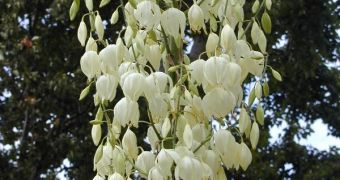We call them yuccas, but in their native areas of Central America, they are rather known under the names of itabo, izote or daguillo. Their closest relative is the famous Agave from which tequila is made. There are about 40 species of yucca (in the genus Yucca), from southwestern US and Mexico to South America and the Caribbean. Amongst the most known species are Joshua tree (Yucca brevifolia) and Spanish bayonet (Yucca aloifolia).
For human use, the most important species is the spineless yucca (Yucca elephantipes). The leaves are up to 1 m (3.3 ft) long, while the chubby woody stem, with a fibrous structure, gray-brown colored, looks like the front feet of an elephant.
The tree grows up to 5-8 m (16-27 ft) tall. During the dry season, especially in February and March, hundreds of bell-like flowers, white-yellowish, adorn this yucca.
Spineless yucca is preferred by gardeners and landscape engineers, because it adapts to various clime and land conditions giving the landscape an exotic, tropical note. Once in Costa Rica was used for making hedges.
The fibers extracted from yucca are used for making mats, belts and rucksacks. But even from the oldest times, the Indigenous people of the Central America (from Guatemala to Costa Rica) ate the flower buds of the various species of yucca, and the fruits and roots, having properties similar to soap, are used for washing clothes.
The flowers have an acid taste, slightly spicy. They can be added to salads or cooked with eggs and potatoes, a favorite dish in Central America. The yucca flowers are rich in vitamins (especially thiamine or vitamin B1 and riboflavin or vitamin B2) and and minerals (like calcium, phosphorus and iron).
An infusion made of yucca leaves has a calming effect for the stomach and can be employed also against albuminuria (the presence of proteins in the urine) and colitis. The leaves also have a diuretic effect.
A small silvery moth, Pronuba yuccasella, is completely dependent of yucca: its larvae feed only on yucca fruits and seeds, and yucca are pollinated only by this insect.

 14 DAY TRIAL //
14 DAY TRIAL // 
